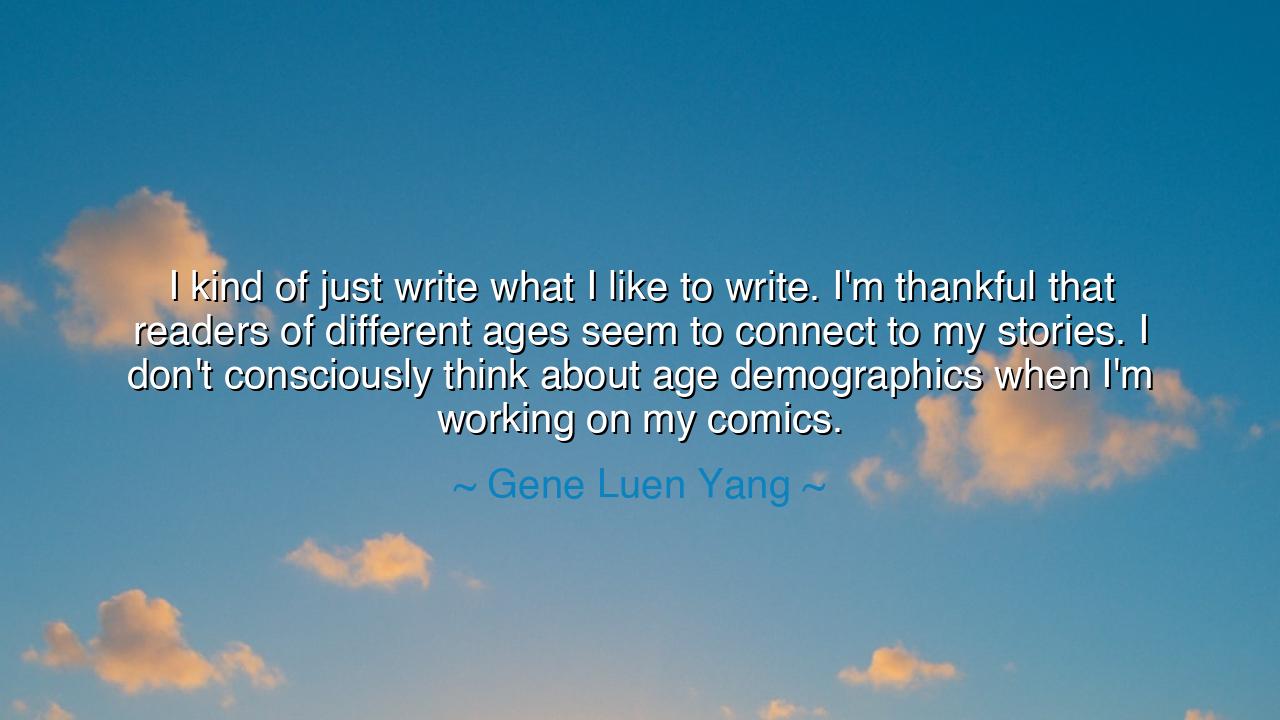
I kind of just write what I like to write. I'm thankful that
I kind of just write what I like to write. I'm thankful that readers of different ages seem to connect to my stories. I don't consciously think about age demographics when I'm working on my comics.






When Gene Luen Yang declares, “I kind of just write what I like to write. I’m thankful that readers of different ages seem to connect to my stories. I don’t consciously think about age demographics when I’m working on my comics,” he speaks to the timeless power of authenticity in art. His words remind us that the truest creations spring not from calculation or marketing, but from the well of the soul. To create from what one genuinely loves is to breathe life into a work, and life, once released, will find hearts to dwell in—whether they are young or old, seasoned or new to the journey.
The origin of this wisdom lies in Yang’s own path as a storyteller. As a writer and artist of comics, he stands in a medium often underestimated, one that some might dismiss as only for children or for passing entertainment. Yet his work has touched readers of all ages, transcending barriers of generation and expectation. He did not force his art to fit into boxes of “child” or “adult,” but simply created with honesty and passion. And in doing so, he discovered the eternal truth: when art is authentic, it speaks a universal language.
This principle is not new. In ancient Greece, Homer sang of heroes, gods, and journeys. Did he stop to consider whether his words would fit young or old, warrior or farmer? No—he sang from the depth of tradition and spirit. And yet, for centuries, people of every age and station have found themselves in the Iliad and Odyssey. In the same way, Yang’s comics resonate because they are not crafted for a category, but for humanity itself. The thankfulness he expresses flows from the realization that art, once released, takes on a life beyond the creator’s control.
His humility also shines. Many would claim mastery over their audiences, boasting of their skill in appealing to demographics. But Yang instead gives thanks. He does not claim that his work deliberately spans generations—he confesses that it was not his plan at all. This humility is itself wisdom, for the artist cannot predict the hearts that will be moved. He can only create with integrity and trust that truth will find its way. His thankfulness is the recognition that what might seem accidental is, in truth, a gift.
There is also a heroic defiance in his words. To ignore demographics is to refuse the chains of commerce and calculation, to place art above market. He writes not what others demand, but what he must. This mirrors the courage of prophets and poets through the ages, who spoke truths not tailored to win applause, but born of conviction. And just as their words endured because they were true, so too Yang’s comics endure because they spring from authenticity rather than strategy.
The lesson for us all is clear: whatever you create—be it stories, music, work, or relationships—let it arise first from authenticity. Do not begin with the question, “Who will approve?” but with, “What is true to my spirit?” For what is genuine will resonate, even with those you never imagined. Like Yang, we must then cultivate gratitude, for the fruits of authenticity often exceed anything we could have designed.
Practical wisdom follows: do not contort your work or your life into pleasing categories. Instead, act with honesty, create with passion, and speak with truth. And when your words, your actions, or your creations touch lives you never intended, pause and be thankful, as Yang is, for such blessings cannot be engineered—they can only be received.
Thus, the teaching of Gene Luen Yang resounds like an ancient chord: live and create authentically, and your truth will transcend the boundaries of age, status, and expectation. To be thankful when others connect with that truth is to honor the mystery of art and life itself. For the spirit that creates in honesty is the spirit that speaks to all generations.






AAdministratorAdministrator
Welcome, honored guests. Please leave a comment, we will respond soon